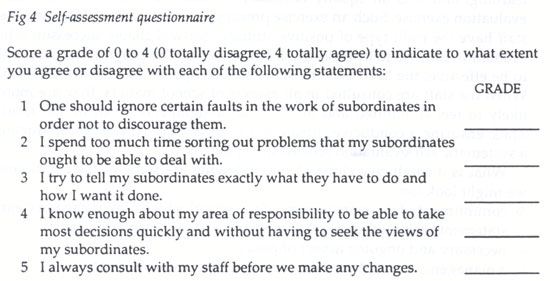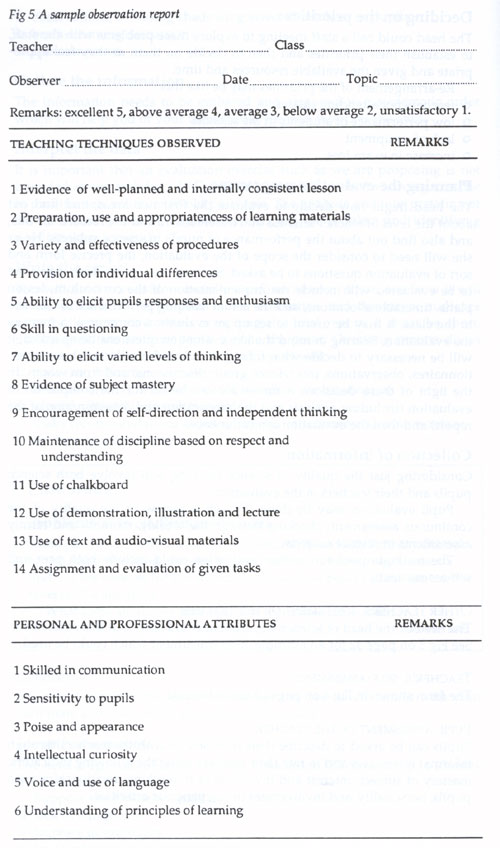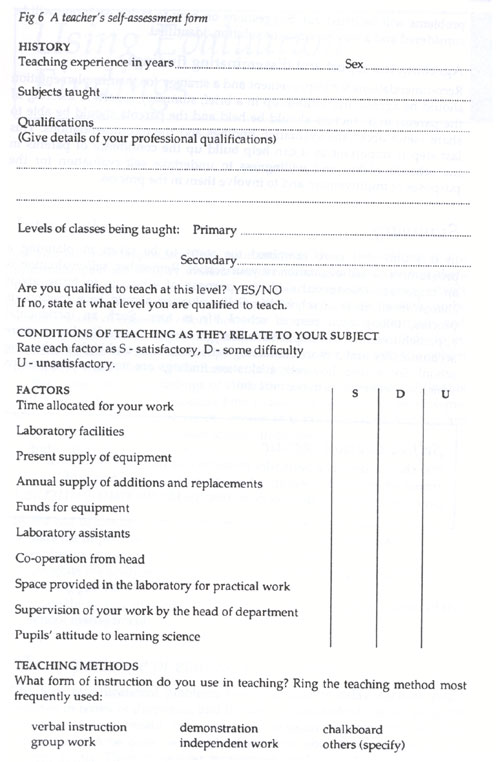Introduction
Evaluation is a key managerial skill, required both by those
from outside schools, such as school inspectors, researchers,
and examiners, and those working from within. This unit focuses
on self-evaluation, that is the process of each school evaluating
its own work as part of a planning and managerial process. This
builds on our discussion of evaluation techniques in Unit
3.
Individual study time: 2 hours
Learning outcomes
By the end of this unit you should be able to:
• analyse the factors which determine how self-evaluation
could be conducted in a school
• plan a suitable evaluation programme for your school
• identify priorities and time-scales within which such
plans could be achieved
• identify the resources available for the evaluation
bearing in mind other pressures on resources
• collect, record, collate, analyse, interpret and report
information.
School readiness for self-evaluation
A conducive school climate is a prerequisite for successful
teaching and learning, and it is an equally necessary condition
for undertaking a self-evaluation exercise. Such an exercise
presupposes that both the head and the staff have the right
type of positive attitude that will enable successful self-evaluation
projects to be conducted. For an evaluation programme in school
to be effective, the head and the staff must co-operate and
work as a team. When the staff are consulted in all aspects
of school matters, they are more likely to feel committed
and to carry out assignments given by the head. Thus, ensuring
a conducive climate is a necessary step towards introducing
a systematic self-evaluation scheme into a school.
What is a conducive climate? The following are some of the
conditions we might look for:
• commitment of the management of the school which is
expressed in clear statements acknowledging the importance
of self-evaluation as a necessary and ongoing aspect of policy
• a management style based on openness, trust and confidence
• an institutional climate which fosters collaboration,
innovation and the expression of ideas, and opinion formed
through rational argument
• a school culture in which there is an expectation of
critically reflective practices, access to information on
current educational thinking and development, and which exploits
the use of available expertise within the local authority,
colleges of education and other agencies
• a district and regional support system which is responsive
to the needs of schools in developing the skills and expertise
needed to develop self-evaluation strategies
• an acknowledgement of the distinctions between self-evaluation
procedures and appraisal procedures (see Module
3, Personnel Management, for detailed consideration of
appraisal)
• considerations of the resource implications of self-evaluation
procedures
• an awareness of the time implications of self-evaluation
activities
• an expectation that identified needs will be satisfied.
Activity 4.1
List the steps you might take to carry out a small survey to
find out how ready you and your staff are to undertake a programme
of systematic evaluation in your school.
Comment
Here is one way to go about it.
1 Prepare a short questionnaire to survey staff opinion on
a range of aspects of your school, including questions about
the following:
• the learning process and level of performance
• the curriculum and how it is implemented in your school
• the physical environment, including provision and maintenance.
2 You could make several simple statements about each aspect
and let your staff react to each. You might also undertake
informal interviews raising questions related to the 'conditions'
listed above.
3 You also need to undertake your own self-assessment. The
questionnaire presented in Fig 4 might be useful.
Fig 4 Self-assessment questionnaire
 |
From your answers you may be able to see whether you are
making all the decisions affecting your school alone, or if
you believe in teamwork and involve your staff in the decision-making.
Note that some seek 'agree' answers, whilst others seek 'disagree'
or even neutral answers. In assessing the climate of your
school, please note that there is no perfect school. No-one
is likely to agree with you about everything! Your teachers
may tend towards being helpers or hinderers. It is your job
to try to make everyone see how they may contribute to the
evaluation and change process in their own way.
Planning an evaluation programme
Identify the issues
In planning a suitable evaluation programme for the school,
the problem areas must be identified and sorted into types
or categories, and then ranked according to criteria such
as urgency and feasibility. Thus you can isolate the problem
or issue to be studied. Such a problem or issue must be important
and manageable; do not try to evaluate too much at one time.
Formulate questions
After selecting the problems or issues to be studied, you
now decide on the specific questions to be asked, and to whom
they will be addressed. For example, the priority may be the
performance of students in a certain subject, or the behaviour
of a particular group of pupils who exhibit deviant traits
by playing truant or by destroying school property. Formulating
questions requires the discipline of keeping within the bounds
of your enquiry and of limiting the number of questions asked.
Fix a time-scale
You now need to fix a time-scale within which to conduct the
evaluation. In fixing this you should take into consideration
the earliest time for the evaluation to be accomplished, the
latest allowable time, and slack periods, during which the
evaluation could be delayed. If the evaluation goes on for
too long people may lose interest and introducing changes
may become more difficult.
Match resources to the programme
It is also very important to identify the resources available
for the evaluation, in particular, the time of those who may
be involved. This is necessary because the successful accomplishment
of the programme will be eroded if, for example, the staff
are too busy to participate. Once resources are allocated
they must be matched to the time-scale and progress monitored
to ensure that the exercise is completed on schedule.
Collect the information
As soon as the preliminary stages have been completed, the
investigating team can begin the work of the evaluation proper.
Basic information on the problem which has been isolated for
study could be obtained using one or more of the following
techniques:
• using diaries that are kept systematically by individual
teachers
• interviews
• observations, including shadowing selected teachers
or pupils
• brain-storming discussions
• questionnaires.
Collate the information
The information needs to be gathered and arranged in a systematic
order which will help you or your team to analyse, and interpret
the data.
Interpret the data
It is important that an evaluation exercise such as we are
proposing is not intended as research for a PhD, but as a
practical, problem-solving exercise to provide new solutions
to old problems. The analysis and interpretation of the data
should thus be limited to describing the problem and identifying
possible ways forward.
Write the report
You will need to consider carefully the form of your report
and how it will be disseminated. The purpose of the evaluation
and the target audience must be kept in view when compiling
the final report. It must be short, perhaps just two or three
pages, and to the point. Overlong reports divert attention
from the set objective. A good report will:
• state the problem
• describe briefly the methods used to collect the information
• identify alternative ways forward
• make recommendations about which path to choose and
what needs to be done to implement it.
Case study
Problems at Ikeja Primary School
Some parents are withdrawing their children from Ikeja Primary
School. Mr Musaazi, the head, decides to mount an evaluation
programme to find out the reasons for the withdrawal and how
best to check (or even reverse) the situation.
What steps should he take? Outline a possible plan of action.
Comments
You could consider the following outline and see how it tallies
with your own plan, and then enrich yours where necessary.
Identifying issues
The head might call a Parent-Teacher Association (PTA) meeting
to identify the problems.
Suppose the problems listed are:
• lack of equipment
• increase in exam fees
• low performance of students in the sciences
• teachers not attending classes as and when due.
Deciding on the priorities
The head could call a staff meeting to explore these problems
with the staff, to establish their priorities and then to
decide on them as they feel appropriate and given the available
resources and time.
Re-arrangement of the priorities may be like this:
• teachers not attending classes
• low performance of students in the sciences
• lack of equipment
• increase in exam fees.
Planning the evaluation programme
The head might now decide to evaluate the first two areas,
and find out about the level of teacher lateness and absenteeism,
and the reasons for this, and also find out about the performance
of pupils in science subjects. He or she will need to consider
the scope of the evaluation, the precise form and sort of
evaluation questions to be asked. Some of the topics which
may need to be evaluated will include the implementation of
the curriculum, lesson plans, timetable allocations, and the
actual teaching performance of teachers in the class. It may
be useful to set up an evaluation committee to manage the
evaluation. Bearing in mind the key evaluation questions being
asked, it will be necessary to decide what information is
to be collected, how (questionnaires, observations, interviews,
group discussions) and from whom. In the light of these decisions
a time-scale can be set for the completion of evaluation (including
analysis and the preparation and dissemination of the report)
and then the evaluation can commence.
Collection of information
Considering just the quality of science teaching will involve
both science pupils and their teachers in the evaluation.
Pupil evaluation may be done through a review of the quality
of the continuous assessment, checking through the weekly,
monthly and termly assessments in science subjects.
The methods used for teacher evaluation could include both
peer and self-assessments.
Other teachers' assessment of the teacher
The head or the head of science department could carry out
this assessment. See Fig 5 for an example of an instrument
which could be used.
Teacher's self-assessment
The form shown in Fig 6 could be used.
Pupil assessment of the teacher
Pupils can be asked to describe their relationship with the
teachers through informal interviews and to rate their teachers
using the following indicators: mastery of subject, interest
and involvement in teaching, relationships with pupils, personality,
and involvement in co-curricular activities
Fig 5 A sample observation report
 |
Fig 6 A teacher's self-assessment form
 |
Recording, analysing and interpreting information
The information collected should now be collated together
and analysed. The committee should write a report to be presented
to the head and staff and a general staff meeting should be
held to discuss the report and its findings. During this discussion,
the various factors responsible for the problems will be listed
out. Suggestions on how to tackle each one will be considered
and a way forward, or solution, identified.
Agreeing the report and disseminating findings
Recommendations for improvement and a strategy for their implementation
should be agreed and written up in a brief, summary report.
A meeting of the parents and teachers should be held and the
parents should be able to share views about the evaluation
findings and the recommendations. This last step is important
as it can help build up the confidence of parents in the school's
ability and willingness to undertake self-evaluation for the
purposes of improvement and to involve them in the process.
Summary
In this unit you have examined the steps to be taken in planning
a programme of self-evaluation in your school. Remember, self-evaluation
is an important managerial skill, the purpose of which is
to bring about change in all areas of school life. Self-evaluation
should be a continuous process, taking each part of school
life in turn. Such an incremental approach to school development
is likely to lead to more self-reliance, more accountability
and a more confident, more motivated and higher achieving
school. Sometimes, however, evaluation findings are not used
for reasons which we will explore in the next
unit.
Self-evaluation exercise
You should identify a particular problem(s) or issue(s) in
your own school which could be evaluated and then plan a programme
of evaluation following the processes described in this unit. |



